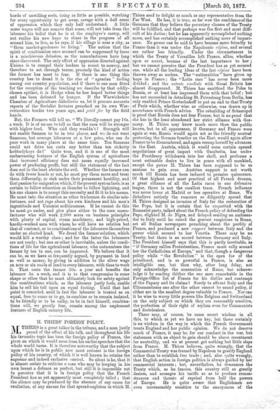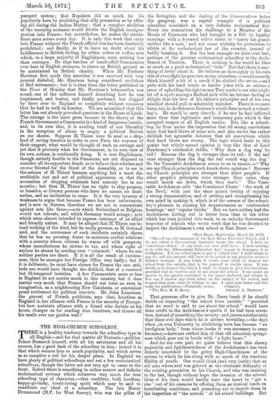M. TRIERS' FOREIGN POLICY.
vi TRIERS is a great talker in the tribune, and a man justly 111. proud of the effect of his talk, and throughout his life his favourite topic has been the foreign policy of France, the pivot on which it would seem from his earlier speeches that the whole world turns. It is therefore noteworthy that the subject upon which he is in public now most reticent is the foreign policy of his country, of which it is well known he retains the supreme and indeed exclusive control. So silent is he, that it is almost unfair to criticise a man who may be keeping in his own breast a defence so perfect, but still it is impossible not to perceive that it is in foreign policy that the French President has as yet apparently most completely failed ; that the silence may be produced by the absence of any cause for exultation, of any excuse for that spread-eagleism in which M.
Thiers used to delight as much as any representative from the Far West. He has, it is true, so far won the confidence of the Germans that they believe the pecuniary clauses of the Treaty will be fulfilled, and that perhaps was the first and most diffi- cult of his duties; but he has apparently accomplished nothing more, and has certainly accomplished nothing more of import- ance. No power can be said to have become more friendly to France than it was under the Napoleonic re'gime, and several are rather less friendly. Under the circumstances in which the Treaty of Versailles left France, allies, whether open or secret, became of the last importance to her ; but we cannot perceive that the President has as yet secured one, while all the leading ideas of the last re'gime have been thrown away as useless. The " nationalities " have given up hope in France ; the "Latin race" has never been more divided ; and the entente cordiale with Great Britain has almost disappeared. M. Thiers has sacrificed the Poles to Russia, or at least has impressed them with that belief ; but has not succeeded in detaching St. Petersburg from Berlin, has only enabled Prince Gortschakoff to put an end to that Treaty of Paris which, whether wise or otherwise, was drawn up in accordance with French advice. The rebuilding of Sebastopol is proof that Russia does not fear France, but is no proof that she has in the least abandoned her strict alliance with Ger- many. M. Thiers may know much more than the public knows, but to all appearance, if Germany and France were again at war, Russia would again act as the friendly neutral protecting the German frontier on the East, would again allow France to be dismembered, and again recoup herself by advances in the East. Austria, which it would seem certain opened negotiations of great import with Gambetta, has under the Presidency withdrawn into her shell, and professes a most estimable desire to live in peace with all mankind, except the power M. Thiers has been supposed to be so anxious to gain over. Austrian support is not worth much till Russia has been induced to promise quiescence. Of that highest and most practical of all French dreams, a great alliance of all the Latin races in one defensive league, there is not the smallest trace. French influence was never lower at Madrid or less operative at Rome. We disbelieve entirely the rumours so diligently spread that M. Thiers designed an invasion of Italy for the restoration of the Pope, but it is certain that he coquetted with the Romanist party, talked about the French policy of defending the Pope, slighted M. de Nigra, and delayed sending an ambassa- dor to Italy until he raised the gravest suspicions in Rome, set all Italian newspapers preaching about the perfidy of France, and produced a new rapport between Italy and the power which secured to her Venetia. There may be no Treaty, but there is an accord between Germany and Italy. The President himself says that this is partly inevitable, as "if Germany rallies Protestantism, France must rally around her the Catholicism of Europe," and that, though a dangerous policy while "the Revolution" is the open foe of the priesthood, and is so powerful in France, is also an intelligible one, but then why, after long delay, not only acknowledge the annexation of Rome, but acknow- ledge it by sending thither the one man remarkable in the Foreign-Office list of France for his dislike and contempt of the Papacy and its claims ? Surely to affront Italy and the Ultramontanes one after the other cannot be sound policy, if either are in the smallest degree valuable to France. Nor can it be wise to worry little powers like Belgium and Switzerland on the only subject on which they are reasonably sensitive, the perfection of their right of asylum even for Communists and doctrinaires.
There may, of course, be some secret wisdom in all this, to which as yet we have no key, but there certainly is no wisdom in the way in which the French Government treats England and her public opinion. We do not deserve much of France, it may be, for our conduct in the war, but statesmen with an object to gain should be above resentment for neutrality, and we at present get nothing but little slaps from France. M. Thiers believes, quite wrongly, that the Commercial Treaty was framed by Napoleon to gratify England rather than to establish free trade ; and, also quite wrongly, that English action in foreign politics is always guided by her commercial interests ; but, nevertheless, he denounces the Treaty which, as he fancies, this country still so greatly desires, and arranges his tariffs so as to produce remon- strances and threats of reprisal from half the powers of Europe. He is quite aware that Englishmen are even unreasonably sensitive to the annoyances of the passport system ; that Napoleon did as much for his popularity here by abolishing that silly precaution as by offer- ing aid during the Indian Mutiny ; that a complete abolition of the worrying nuisance would double the English immigra- gration into France ; but, nevertheless, he makes the restric- tions more severe every day. It is only this week that entry into France without the French official visa has been absolutely prohibited ; and finally, as if to leave no doubt about his indifference to British feeling, he either orders or suffers acts which, to a large majority of Englishmen, seem nothing less than outrages. He slips batches of handcuffed Communists over here in English steamers, to starve on Bzitish ground, or
be maintained by British charity. When Mr. Frederic Harrison first made this assertion it was received with very general disbelief, Mr. Harrison being considered credulous of Red statements ; but it is clear from the letter published in the Times of Monday that Mr. Harrison's information was sound, one of the sufferers himself describing how he was imprisoned, and beaten, and finally pardoned, but shipped by force over to England so completely without resources that he had to walk te London. We are astonished that this letter has not already provoked questions in the House of Lords. The outrage is the more gross because in the theory of the French Government a Communist is a kind of dangerous lunatic, and, in its own idea, it is availing itself of our liberality in the reception of aliens to empty a political Bicetre on our shores. Suppose M. Thiers were to send us a ship- load of raving lunatics in order to save Paris the expense of their support, what would be thought of such an outrage, and yet that a precisely what his Government, in its own view of its own actions, is continually doing. It is true Englishmen, though entirely hostile to the Commune, are not disposed to consider all its supporters fiends, or to believe that scholars and savans thirsted for the blood of the Assembly, or to see in the seizure of M. Thiers' bronzes anything but a most dis- creditable riot and act of political oppression, so that the accusation of shipping criminals here scarcely lies in our mouths ; but then M. Thiers' has no right to ship paupers, or lunatics, or literary persons who have no means, no desti- nation, and no inclination to come. It is the very tyranny of weakness to argue that because France has been unfortunate, and is now in distress, therefore we are not to remonstrate against acts like these,—acts which Switzerland or Belgium would not tolerate, and which Germany would avenge ; acts which seem almost intended to express contempt of an allied and friendly nation. It may be alleged that M. Thiers can in- tend nothing of the kind, but he really governs, as M. Guiraud said, and the occurrence of such incidents certainly shows that he has no pressing desire to maintain cordial relations with a .country whose citizens he warns off with passports, whose manufactures he strives to tax, and whose right of asylum he abuses by sending over " criminals " whom he can neither pardon nor shoot. If it is all the result of careless- ness, then he manages the Foreign Office very badly ; but if it is deliberate, he must have chosen for France the one atti- tude one would have thought she disliked, that of a reserved but ill-tempered isolation. A few Communists more or less in England do not matter much to this country, but it does matter very much that France should not treat us, even in imagination, as a neighbouring New Caledonia, or convenient penal settlement for political convicts. Mr. John Lemoinne, the gravest of French publicists, says that, heartless as England is, her alliance with France is the security of Europe; but how maintain alliance with a friend who forbids us his house, charges us for sending him furniture, and throws all his snails over our garden wall ?



































 Previous page
Previous page